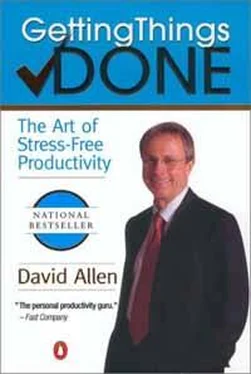Clarity
Too many discussions end with only a vague sense that people know what they have decided and are going to do. But without a clear conclusion that there is a next action, much less what it is or who's got it, more often than not a lot of "stuff" gets left up in the air.
I am frequently asked to facilitate meetings. I've learned the hard way that no matter where we are in the conversation, twenty minutes before the agreed end-time of the discussion I must force the question: "So what's the next action here?" In my experience, there is usually twenty minutes' worth of clarifying (and some-times tough decisions) still required to come up with an answer.
This is radical common sense—radical because it often compels discussion at deeper levels than people are comfortable with. "Are we serious about this?" "Do we really know what we're doing here?" "Are we really ready to allocate precious time and resources to this?" It's very easy to avoid these more relevant levels of thinking. What prevents those issues from slipping away into amorphous "stuff" is forcing the decision about the next action. Some further conversation, exploration, deliberation, and negotiation are often needed to put the topic to rest. The world is too unpredictable these days to permit assumptions about outcomes: we need to take responsibility for moving things to clarity.
Talk does not cook rice.
— Chinese
You have to have some experience of this to really know what I mean here. If you do, you're probably saying to yourself, "Yes!" If you're not sure what I'm talking about, I suggest that in your next meeting with anyone, you end the conversation with the question, "So what's the next action here?" Then notice what happens.
Accountability
The dark side of "collaborative cultures" is the allergy they foster to holding anyone responsible for having the ball. "Mine or yours?" is unfortunately not in the common vocabulary of many such organizations. There is a sense that that would be impolite. "We're all in this together" is a worthy sentiment, but seldom a reality in the hard-nosed day-to-day world of work. Too many meetings end with a vague feeling among the players that something ought to happen, and the hope that it's not their personal job to make it so.
The way I see it, what's truly impolite is allowing people to walk away from discussions unclear. Real "togetherness" of a group is reflected by the responsibility that all take for defining the real things to do and the specific people assigned to do them, so everyone is freed of the angst of still-undecided actions.
Again, if you've been there, you'll know what I'm talking about. If you haven't, test it out—take a small risk and ask "So what's the next action on this?" at the end of each discussion point in your next staff meeting, or in your next "family conversation" around the dinner table.
Productivity
Organizations naturally become more productive when they model and train front-end next-action decision-making. For all the reasons mentioned above, determining the required physical
allocation of resources necessary to make something happen as soon as the outcome has been clarified will produce more results sooner, and with less effort.
Learning to break through the barriers of the sophisticated creative thinking that can freeze activity—that is, the entangled psychic webs we spin—is a superior skill. "Productivity" has been touted for decades as a desirable thing to improve in organizations. Anything that can help maximize output will do that. But in the world of knowledge work, all the computers and telecom improvements and leadership seminars on the planet will make no difference in this regard unless the individuals involved increase their operational responsiveness. And that requires thinking about something that lands in your world before you have to. One of the biggest productivity leaks I have seen in some organizations is the lack of next actions determined for "long-term" projects. "Long-term" does not mean "Someday/Maybe."
Those projects with distant goal lines are still to be done as soon as possible; "long-term" simply means, "more action steps until it's done," not "no need to decide next actions because the day of reckoning is so far away." When every project and open loop in an organization is being monitored, it's a whole new ball game.
Productivity will improve only when individuals increase their operational responsiveness. And in knowledge work, that means clarifying actions on the front end instead of the back.
Empowerment
Perhaps the greatest benefit of adopting the next-action approach is that it dramatically increases your ability to make things happen, with a concomitant rise in your self-esteem and constructive outlook.
People are constantly doing things, but usually only when they have to, under fire from themselves or others. They get no sense of winning, or of being in control, or of cooperating among themselves and with their world. People are starving for those experiences.
The daily behaviors that define the things that are incomplete and the moves that are needed to complete them must change. Getting things going of your own accord, before you're forced to by external pressure and internal stress, builds a firm foundation of self-worth that will spread into every aspect of your life. You are the captain of your own ship; the more you act from that perspective, the better things will go for you.
Asking "What's the next action?" undermines the victim mentality. It presupposes that there is a possibility of change, and that there is something you can do to make it happen. That is the assumed affirmation in the behavior. And these kinds of "assumed affirmations" often work more fundamentally to build a positive self-image than can repeating "I am a powerful, effective person, making things happen in my life!" a thousand times.
Is there too much complaining in your culture? The next time someone moans about something, try asking, "So what's the next action?" People will complain only about something that they assume could be better than it currently is. The action question forces the issue. If it can be changed, there's some action that will change it. If it can't, it must be considered part of the landscape to be incorporated in strategy and tactics. Complaining is a sign that someone isn't willing to risk moving on a changeable situation, or won't consider the immutable circumstance in his or her plans. This is a temporary and hollow form of self-validation.
People are always blaming their circumstances for what they are. I don't believe in circumstances. The people who get on in this world are the people who get up and look for the circumstances they want, and, if they can't find them, - make them.
—George Bernard Shaw
Although my colleagues and I rarely promote our work in this way, I notice people really empowering themselves every day as we coach them in applying the next-action technique. The light in their eyes and the lightness in their step increase, and a positive spark shows up in their thinking and demeanor. We are all already powerful, but deciding on and effectively managing the physical actions required to move things forward seems to exercise that power in ways that call forward the more positive aspects of our nature.
When you start to make things happen, you really begin to believe that you can make things happen. And that makes things happen.
13. The Power of Outcome Focusing
THE POWER OF directing our mental and imaginative processes to create change has been studied and promoted in thousands of contexts—from the early "positive thinking" books to recent discoveries in advanced neurophysiology.
Читать дальше











